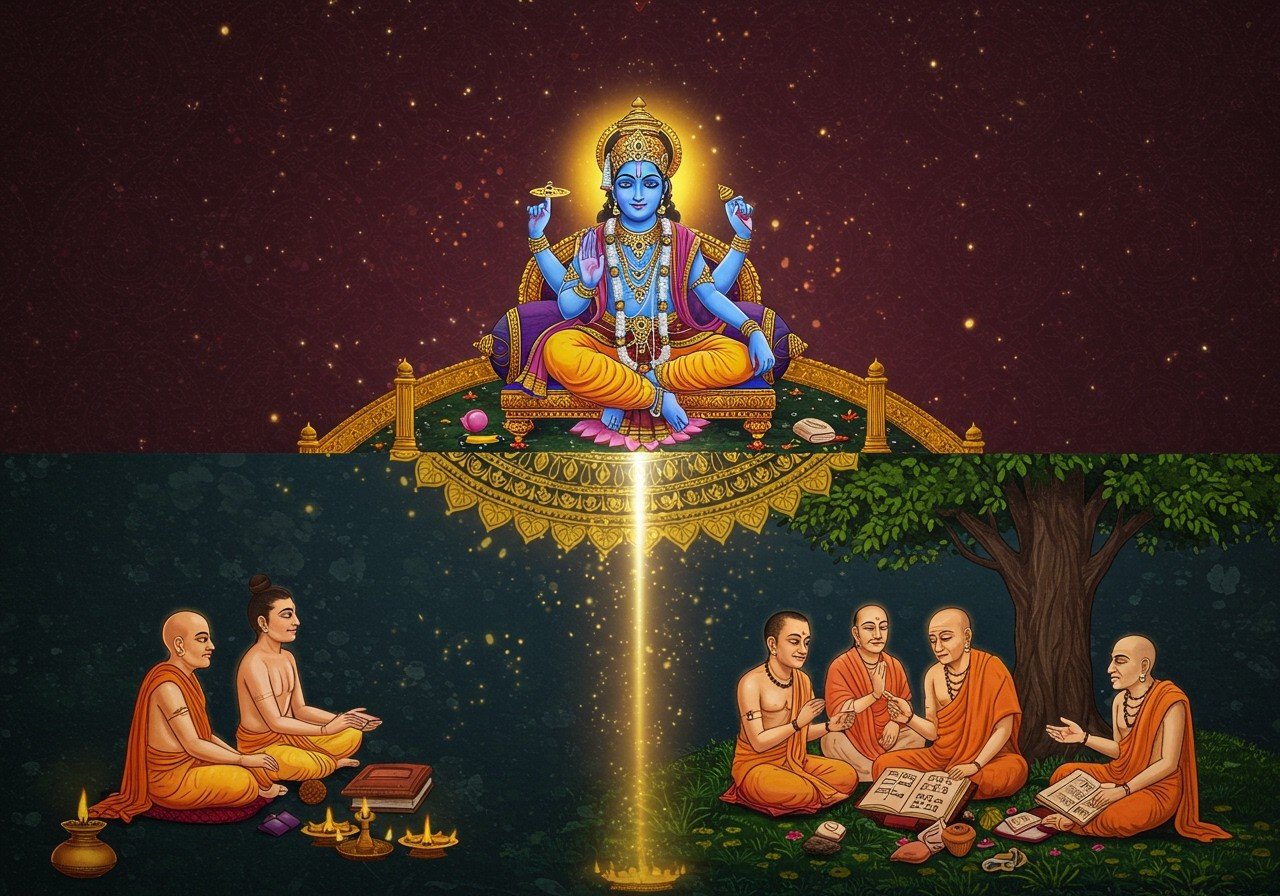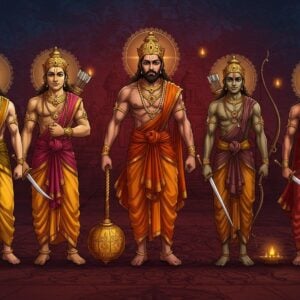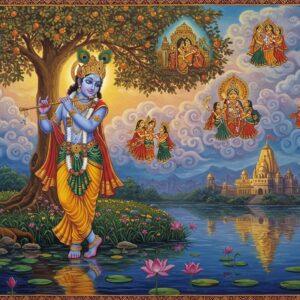
Step into the intriguing world of Dvaita Vedanta, a prominent dualistic school of thought within the Vedanta tradition of Hindu philosophy. Established by the influential philosopher Madhvacharya in the 13th century, Dvaita Vedanta offers a unique perspective on spirituality, especially for those who value tradition and seek a deeper understanding of their spiritual journey. It bridges the gap between ancient wisdom and contemporary spiritual discussions.
What is Dvaita Vedanta?
Dvaita Vedanta emphasizes the distinct and eternal separation between the individual soul (Atman or Jiva) and the ultimate reality (Brahman), who is identified as Vishnu/Narayana. This core principle of dualism (Dvaita in Sanskrit) sets it apart from other non-dualistic philosophies like Advaita Vedanta. Dvaita Vedanta outlines five fundamental differences (pancha-bheda) to clarify its teachings:
- Between the individual soul (Jivatman) and God (Paramatma). This distinction emphasizes the individual’s unique existence separate from the divine.
- Between individual souls. Each soul is unique and independent, not merging into a universal consciousness.
- Between matter and God. The material world is real and distinct from the divine creator, Vishnu.
- Between matter and individual souls. The material world interacts with individual souls, creating experiences, but remains separate.
- Between different types of matter. The diversity within the material world is real and not an illusion.
In Dvaita, God is seen as a personal deity with attributes (Saguna Brahman), and liberation (moksha) is attained through devotion (bhakti). This philosophy also shapes ethical and moral conduct in daily life.
What Does Dvaita Vedanta Advocate?
Dvaita Vedanta centers around personal devotion (bhakti) to a personal God, primarily Vishnu or Krishna. This devotion is considered the key to achieving liberation. Sacred texts like the Vedas, Upanishads, and the Bhagavad Gita, interpreted through the lens of Dvaita, provide guidance for followers. Rituals and worship are important for nurturing a personal relationship with the divine. The pursuit of ‘ananda‘ or bliss in God’s presence is a central goal. Socially, Dvaita Vedanta encourages righteous living and service to others. This philosophy also provides comfort and wisdom by offering an understanding of evil and suffering through a dualistic lens.
You can explore more about Hindu symbols and their significance in our blog post: Hindu Symbols Explained: Their Meanings and Importance.
Who Founded Dvaita Vedanta?
Madhvacharya, a brilliant 13th-century philosopher and theologian, founded Dvaita Vedanta. His spiritual experiences and deep insights led to the development of this profound philosophy. He critiqued other Vedantic schools, especially Advaita Vedanta, thereby solidifying Dvaita’s distinct tenets. His major works, including Anu Vyakhyana and Brahma Sutra Bhashya, form the foundation of Dvaita Vedanta. Madhvacharya revitalized the Bhakti movement, emphasizing a personal connection with God. His influence continues to resonate with generations of thinkers and followers worldwide.
Learn more about Hindu philosophy in our informative guide: Hindu Philosophy Explained: A Beginner’s Guide.
Influence and Legacy of Dvaita Vedanta
Dvaita Vedanta’s influence spread across India and beyond, particularly through the Ashta Mathas (eight monasteries) established by Madhvacharya. The philosophy significantly shaped the Bhakti movement and impacted various other religious traditions. Scholars over the centuries have contributed to its rich legacy through various interpretations. Even today, Dvaita Vedanta remains relevant for spiritual seekers, adapting to modern contexts while retaining its core essence. Its cultural and social impact is significant for communities that follow its teachings.
Core Concepts of Dvaita Vedanta
Here’s a breakdown of key concepts:
- Brahman: In Dvaita Vedanta, Brahman is not an impersonal force but a personal God, Vishnu, possessing qualities like compassion, knowledge, and power (Saguna Brahman).
- Atman/Jiva: The individual soul is eternally distinct from Brahman, each Jiva possessing unique characteristics.
- Maya/Jada: Matter is considered real, not an illusion, but it is dependent on God for its existence.
- Moksha (Liberation): Liberation is achieved through devotion (bhakti) to Vishnu. It is not a merging with Brahman but attaining eternal service and bliss in His presence, retaining one’s individual identity. Knowledge of God’s greatness is crucial for liberation.
Spiritual Practice (Sadhana) in Dvaita Vedanta
Dvaita Vedanta emphasizes these practices:
- Bhakti: Devotion to Vishnu is central. It involves prayer, worship, and cultivating a personal relationship with God.
- Knowledge: Understanding the nature of God, the soul, and their distinct relationship is essential for spiritual growth.
- Grace: Ultimately, liberation is attained through Vishnu’s grace (prasada).
Explore our range of holy books to deepen your understanding of Dvaita Vedanta: Poojn.in Holy Books Collection.
Comparison with Advaita Vedanta
| Feature | Dvaita Vedanta | Advaita Vedanta |
|---|---|---|
| Relationship | Dualistic (God and soul are separate) | Non-dualistic (God and soul are ultimately one) |
| Nature of Brahman | Personal God (Vishnu) | Impersonal, attributeless reality |
| World | Real | Ultimately an illusion (Maya) |
| Liberation | Close relationship with God | Realizing oneness with Brahman |
| Path | Devotion (Bhakti) | Knowledge (Jnana) |
Discover more about Yantras and Yagyas with our beginner’s guide: Yantras and Yagyas Explained.
Key Figures in Dvaita Vedanta
- Madhvacharya: The founder of Dvaita Vedanta. His teachings continue to shape the understanding of this philosophy.
Find authentic Rudraksha and Tulsi beads, sacred symbols in Hinduism, at Poojn.in.
Embracing the Wisdom of Dvaita Vedanta
Dvaita Vedanta provides a unique spiritual path for those seeking a stronger connection with tradition and a deeper understanding of the divine. Its teachings illuminate the distinct nature of reality and guide followers toward a life of devotion and righteousness. Embracing these principles brings clarity and purpose to one’s spiritual journey. Madhvacharya’s vision continues to inspire and guide seekers on their path to spiritual growth.
Poojn.in: Supporting Your Dvaita Vedanta Practice
Poojn.in offers a wide selection of products to enhance your Dvaita Vedanta practice. We provide items like brass and copper idols of Lord Vishnu and His avatars, traditional puja items, sacred texts, Tulsi malas and stands, copper and brass vessels, and authentic sandalwood paste and kumkum. Our products, sourced from verified vendors, undergo strict quality checks to ensure they meet traditional standards. Explore our collection and support your spiritual journey with authentic and high-quality items. Visit www.poojn.in today!
You can also check out our collection of decorative items for your puja room: Decorative Items. We also offer a variety of flammable items necessary for puja rituals: Flammable Items.


